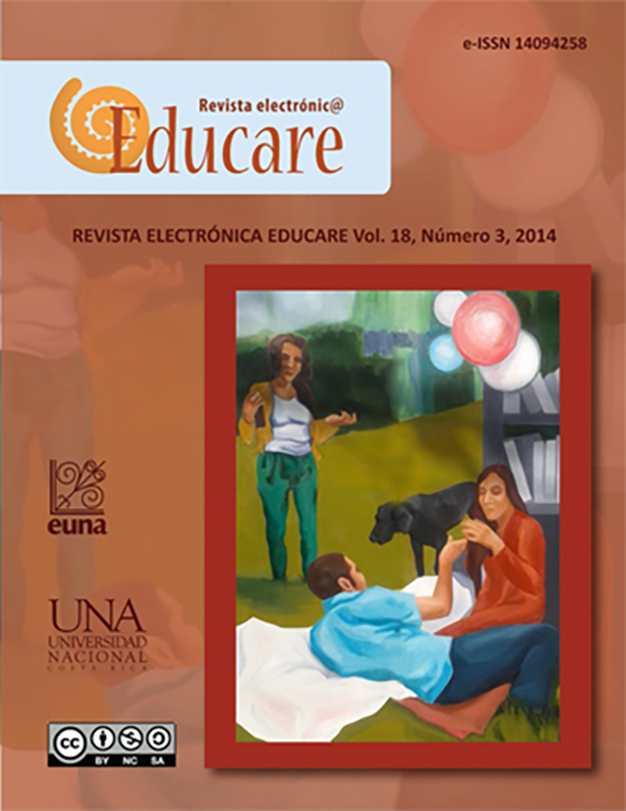The Use of a Hybrid Strategy Combining Problem-based Learning and Magisterial Lectures to Enhance Learning
DOI:
https://doi.org/10.15359/ree.18-3.8Keywords:
Strategy, PBL, magisterial lectures, digital didactic resources, teaching, didactic methods, university pedagogy, digital board.Abstract
This paper addresses the problem of capturing the attention of intermediate level students in the Thermodynamics 1 course from the Mechanical and Agricultural Engineering Program, with the purpose of helping students improve their learning process. A hybrid teaching strategy was proposed based on Problem-based Learning (PBL) principles combined with magisterial lectures. Digital and traditional didactic resources were also used in order to find the best mean to minimize the lack of attention in learners. The strategy was developed by sensitizing students to get involved in their formation process. PowerPoint presentations, video clips, the traditional white board and an ultra slim digital tablet board were used to develop the theoretical issues and present the solutions to the problems chosen for the PBL strategy. Finally, the strategy was evaluated and results were analyzed, indicating that using a hybrid strategy combining PBL and traditional magisterial lectures is an optimal resource to improve the learning process of students taking Thermodynamics 1. In addition, it was also concluded that the ultra slim digital tablet board is the optimal didactic resource.
References
Universidad de Murcia. (2011). La metodología de aprendizaje basado en problemas en psicología. Recuperado de http://ocw.um.es/cc.-sociales/la-metodologia-de-aprendizaje-basado-en-problemas/?searchterm=None
Instituto Tecnológico y de Estudios Superiores de Monterrey. (2010). Ventajas del aprendizaje basado en problemas. Recuperado de http://sitios.itesm.mx/va/dide2/tecnicas_didacticas/abp/ventajas.htm
Servicio de Innovación Educativa. Universidad Politécnica de Madrid. (2008). Aprendizaje basado en problemas. Guías rápidas sobre nuevas metodologías. Recuperado de http://innovacioneducativa.upm.es/guias/Aprendizaje_basado_en_problemas.pdf
Morales, P. y Landa, V. (2004), Aprendizaje basado en problemas. Theoria, 13, 145-157. Recuperado de http://campus.usal.es/~ofeees/NUEVAS_METODOLOGIAS/ABP/13.pdf
Gamboa, R., (mayo-agosto, 2014). Relación entre la dimensión afectiva y el aprendizaje de las matemáticas. Revista Electrónica Educare, 18(2), 117-139. doi: http://dx.doi.org/10.15359/ree.18-2.6
Universidad de Costa Rica. Docencia Universitaria. (2010). Guía de fases para la construcción de estrategias didácticas. San José, Costa Rica: Autor (manuscrito inédito).
Univerity of Delaware. (s. f.). (2013). Why PBL? Learning Begins with a Problem… [Por qué ABP? El aprendizaje comienza con un problema…]. Recuperado de http://www.udel.edu/inst/why-pbl.html
Downloads
Published
How to Cite
Issue
Section
License
1. In case the submitted paper is accepted for publication, the author(s) FREELY, COSTLESS, EXCLUSIVELY AND FOR AN INDEFINITE TERM transfer copyrights and patrimonial rights to Universidad Nacional (UNA, Costa Rica). For more details check the Originality Statement and Copyright Transfer Agreement
2. REUTILIZATION RIGHTS: UNA authorizes authors to use, for any purpose (among them selfarchiving or autoarchiving) and to publish in the Internet in any electronic site, the paper´'s final version, both approved and published (post print), as long as it is done with a non commercial purpose, does not generate derivates without previous consentment and recognizes both publisher's name and authorship.
3. The submission and possible publication of the paper in the Educare Electronic Journal is ruled by the Journal’s editorial policies, the institutional rules of Universidad Nacional and the laws of the Republic of Costa Rica. Additionally, any possible difference of opinion or future dispute shall be settled in accordance with the mechanisms of Alternative Dispute Resolution and the Costa Rican Jurisdiction.
4. In all cases, it is understood that the opinions issued are those of the authors and do not necessarily reflect the position and opinion of Educare, CIDE or Universidad Nacional, Costa Rica. It is also understood that, in the exercise of academic freedom, the authors have carried out a rogorous scientific-academic process of research, reflection and argumentation thar lays within the thematic scope of interest of the Journal.
5. The papers published by Educare Electronic Journal use a Creative Commons License:















 The articles published by Educare Electronic Journal can be shared with a Creative Commons License:
The articles published by Educare Electronic Journal can be shared with a Creative Commons License: 



